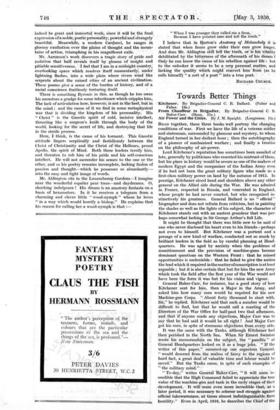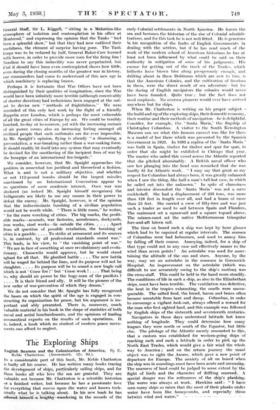Towards Better Things
From Chauffeur to Brigadier, By. Brigadier-General C. B. - - Air Power and the Cities. By J. M. Spaight. (Longmans. 15s.)
READ together, these three books well portray the changing conditions of war. First we have the life of a veteran soldier and statesman, surrounded by glamour and mystery, to whom England turned in her-darkest hour ; then the autobiography
of a pioneer of mechanized warfare ; and finally a treatise _ on the philosophy of air-power.
Lord Kitchener's reputation has sometimes been assailed of late, generally by politicians who resented his mistrust of them, but his place in history would be secure as one of the makers of modern Egypt and the reorganizer of the Indian Army even if he had not been the great solitary figure who made us a first-class military power on land by the autumn of 1915. In prestige, Kitchener stood head and shoulders above any other general on the Allied side during the War. He was admired in France, respected in Russia, and venerated in England, whose people he had never courted, but who recognized in- stinctively his greatness. General Ballard is no " official " biographer and does not refrain from criticism,-but in painting the shades as well as the lights of his subject, the character of Kitchener stands out with an austere grandeur that was 'per- haps somewhat lacking in Sir George Arthur's full Life.
It might be thought that there was little new to be said of one who never disclosed his heart even to his friends—perhaps not even to himself. But Kitchener was a portent and a presage of a new kind-of warfare, conducted not so much by 'brilliant leaders in the field as by careful pluming at Head- quarters. He was aged by anxiety when the problems of munitionment and the provision of machine-guns became dominant questions on the Western Front : that he missed opportunities is undeniable : that he failed to give the nation the lead which it required in the matter of conscription is at least arguable ; but it is also certain that but for him the new Army which took the field after the first year of the War would not have been the force it was but for his vision and vigour.
' General Baker-Carr, for instance, has a good story of how Kitchener sent for him, then a Major in the Army, and asked him how many men would be required for his new Machine-gun Corps. "About forty thousand to start with, Sir," he replied. Kitchener said that such a number would be difficult to find, but that he would call a meeting of the Directors of the War Office for half-past two that afternoon, and that if anyone made any objections, Major Carr as to 'say that he had said it would be all right ! And Major Carr got his men, in spite of strenuous objections from every side.
It was the same with the Tanks, although Kitchener had :then perished in the North Sea. When Sir Ernest Swinton ,wrote- his memoranduin on the subject, the " pandits " at General Headquarterslooked on it as a huge joke. "If the writer of this paper," summed-up one sagacious General, "would descend from the realms of fancy to the regions a hard fact, a great deaf of valuable time and labour would be saved." But the Tanks came, in spite of such examples of " the military mind." -
"To-day," writes General 13alcer-Carr, ' it will seem in 'credible that the High Command failed to appreciate the true value of the machine-gun and tank in the early stages of their development. It will seem even more incredible that, at a later period, it was necessary to -scheme and struggle against official lukewarmness, at times almost indistinguishable from hostility." Even in April, 1918, he describes the Chief of the General_ Staff, Kiggell; "sitting. in a Mahatma-like
atmosphere of isolation and contemplation- in 'his office at Montreuil," and expressing the opinion that the Tanks "had been a splendid show," but that they had now outlived their usefulness, the element of surprise having gone. The Tank Corps was to be reduced by half, General Baker-Carr learned with horror, in order to provide more Men foi the firing line ! Needless to say this imbecility was never perpetrated, but that it should have been even contemplated,shows how lilt*, even during the closing months of the greatest War in history. our commanders had .come to understand of this new age in which machinery is replacing brawn.
Perhaps it is fortunate that War Offices have not been distinguished by their qualities of imagination, since the War would have been infinitely more terrible (although conceivably of shorter duration) had technicians been engaged at the out- set to devise new "methods of frightfulness." We were reminded of this only last week by the flight of a friendly Zeppelin over London, which is perhaps the most vulnerable of all the great cities of Europe by air. We could be terribly bombed, to-day or to-morrow, yet with the increasing menace of air power comes also. an increasing feeling amongst all civilized people that such outbreaks are for ever impossible. In Mr. Spaight's opinion, flying is already a disarming, a preventative, a war-breaking rather than a war-making force. It should readily lit itself into any system that may eventually be devised for the smothering of the incipient fires of war by the hosepipe of an international fire-brigade."
We consider, however, that Mr. Spaight approaches the problem in somewhat too juridical and theoretical a fashion. What is and is not a military objective, and whether or not 112-pound bombs should be the largest missiles sanctioned by an International Convention appear to us questions of mere academic interest. Once war was declared (as indeed Mr. Spa ight himself recognizes) the belligerents are likely to use any means_ in their power to defeat the enemy. Mr. Spaight, however, is of the opinion that the indiscriminate bombing of a civilian population would not be worthwhile. - "There is little room," he writes,
for the mere wrecking of cities. The big marks, the profit- able marks—arsenals, war factories, aerodromes, dockyards, iron works, steel works—lie outside the cities Apart 'from all question of possible retaliation, the bombing of
cities is a gamble To strike at armament and its sources is, in contrast, by all professional standards sound war." This leads, in his view, to the vanishing point of war." ." We are in face of something at once revolutionary and evolu- tionary. Clausewitz would approve, but he would stand 'aghast for all that. He glorified battle. . . . The new battle Will be waged far behind the lines, and its purpose will not be
daughter Its purpose will be to sound a new bugle call which is not Cease fire ! ' but Cease work' That being So, why should air power be the bogy-man of the pacifists ? . . . It is their friend and ally. It will, be the pioneer of the new order of war-prevention of which they dream."
We do not consider that Mr. Spaight has fully recognized the bases on which the spirit of the age is engaged in con- structing its organization for peace, but his argument is im- portant and ably presented. There is, moreover, much valuable material in his book in the shape of statistics of both naval and aerial bombardments, and the opinions of leading aeronautical experts on the results of such operations. It is, indeed, a book which no student of modern peace move- ments can afford to neglect.















































 Previous page
Previous page